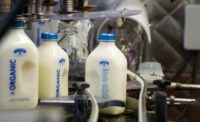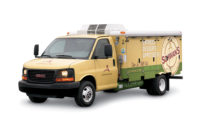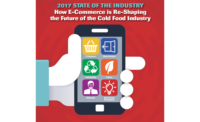Sustainable food processing is key to a greener future
Find out how Lamb Weston, Challenge Dairy, Emmi Roth and JSB Industries go green.

Emmi Roth installed a 1 MG ADI-BVF reactor to anaerobically pre-treat wastewater at its Platteville, Wis., cheese processing plant.
For Kermit the Frog, “it’s not easy being green.” “It seems you blend in with so many other ordinary things,” he sings. However, these days, being green isn’t so ordinary.
Being green used to be about energy efficiency and recyclable packaging, supply chain optimization and obtaining LEED certification. And, while these factors are necessary to achieve sustainability, it’s the enhanced equipment and technologies that allow many of today’s refrigerated and frozen food processors to be extraordinary.
Here’s a snapshot of what Lamb Weston, Challenge Dairy, Emmi Roth, JSB Industries and other industry leaders are doing to “be green.”
Reformulated packaging opens opportunities for more recycling streams
Lamb Weston’s sustainability philosophy and goals, coupled with its focus on innovation, translates to green technologies integrated across the supply chain.
For example, farming practices include precision farming equipment such as GPS tractors, soil moisture monitoring, plant tissue sampling and analysis and areal infrared photography to monitor plant health.
Some of its locations utilize anaerobic digestion within the wastewater treatment systems to offset a portion of the company’s non-renewable energy consumption.
Packaging practices include optimization of corrugated linerboard to reduce fiber and retain strength while shipping the same volume of frozen potato specialties, says Kim Williams, director of project management, innovation.
Two of its manufacturing plants—Delhi, La., and Boardman East, Ore.—are LEED certified.
Furthermore, Lamb Weston maintains a sustainable packaging goal to develop specifications that protect product integrity throughout the supply chain, says Williams.
And, one method pursued is the increased use of sustainable packaging technologies.
That’s why the Eagle, Idaho-based processor of frozen potato specialties partnered with Graphic Packaging International (GPI), Atlanta, to develop Tite-Pak.
“Tite-Pak is the material Lamb Weston utilizes to package frozen potato products for the foodservice industry,” says Williams. “Tite-Pak consists of natural Kraft paper from virgin fibers with a polyethylene blend coating on the inside, which easily separates from the paper during the recycle process. Tite-Pak has 88.7% recoverable natural Kraft fibers, which is a high-quality material.”
Before Lamb Weston reformulated this packaging material, the polyethylene blend coating didn’t easily separate from the paper, making it non-recyclable.
“Following optimization by GPI, the polyethylene blend easily separates from the fiber during the re-pulping process, allowing for the recovery and recycling of high-quality fiber.”
Tite-Pak can also be recycled with old corrugated containers, and is said to divert about 30 million pounds of material from landfill upon full implementation of the package.
“Sustainability doesn’t have an end point; it’s a continual effort of improvement and innovation,” Williams adds. “Collaboration has also been critical as a sustainable solution to developing green technologies throughout our supply chain via supplier innovation work and university engagement.”

Earlier this year, JSB Industries completed a major energy efficient LED lighting retrofit at its Chelsea and Lawrence, Mass., manufacturing facilities.
Solar-powered transport refrigeration unit cuts emissions
Challenge Dairy Products, Inc., a Dublin, Calif.-based dairy foodservice provider, is dedicated to finding greener methods of transporting product.
In fact, eight years ago, Challenge Dairy was said to be the first company to replace diesel-powered cold plates to cut emissions. It’s also said to be the first company in California to install emissions filters before they were required.
“Eight years ago, Challenge Dairy began replacing diesel-powered cold plates with electrical-powered plates in efforts to cut emissions,” says Tom Ditto, vice president of foodservice. “We will continue that transition until all trucks are outfitted with electrical-powered cold plates.”
Fast forward to today, and Challenge Dairy is also now said to be the first foodservice provider to deliver products via a solar-powered, zero-emissions, commercial-use transport refrigeration unit (TRU).
“Challenge Dairy began testing a bobtail truck outfitted with the first solar-powered, zero-emissions, commercial-use TRU in April 2017, and results are showing emission reductions of 98% for nitrous oxide, 86% for carbon dioxide and 97% for particulate matter—a big win for air quality in California and eventually the planet,” says Ditto.
Challenge Dairy partnered with eNow Software, Irvine, Calif.; Johnson Refrigerated Truck Bodies, Rice Lake, Wis.; and Emerson, St. Louis, Mo.; to develop first-to-market technology that allows for refrigeration without diesel through cold plates and a lightweight solar-charged battery system. The San Joaquin Valley Air Pollution Control District, Modesto, Calif., funded the initiative as part of its Technology Advancement Program.
“Refrigerated trucks need extra power to keep products cool during transport, and this ‘extra power’ comes in the form of a TRU,” says Ditto. “Challenge Dairy plans to continue comparing options to determine the most efficient and effective green transportation methods. Additionally, we are looking into partnering with eNow to test a solar-powered unit capable of refrigerating a trailer truck.”
In efforts to conserve energy, Challenge Dairy also outfitted two warehouses with LED lighting.
“Challenge Dairy plans to continue comparing options to determine the most efficient and effective green transportation methods,” adds Ditto.

Lamb Weston partnered with Graphic Packaging International to develop Tite-Pak, environmentally-friendly packaging that’s recyclable in the established old corrugated container and mixed paper recycling streams.
Pre-treating wastewater lowers operational costs
Specialty cheese processor Emmi Roth used to incur steep wastewater disposal costs at its Platteville, Wis., plant.
“We were paying municipal surcharges for treating our cheese processing wastewater and paying to haul high-strength waste offsite,” says Robert Frie, director of operations. “We wanted to be more independent, lower operational costs, and above all, remain environmentally responsible.”
That’s why Emmi Roth, Fitchburg, Wis., installed a 1 MG ADI-BVF reactor to anaerobically pre-treat wastewater.
ADI Systems, the Canada-based manufacturer of the anaerobic system, designed the ADI-BVF unit for dairy wastewater. The ADI-BVF reactor can reliably treat moderate-to-high concentrations of organics, suspended solids and fat, oil and grease in a single stage—typically without the need for primary treatment.
“Our investment in the anaerobic technology will allow us to utilize biogas as a source of energy in the future, if desired,” adds Frie. “We want to capture the energy generated and utilize it in our processes like supplying energy/gas to our hot water boilers. This is planned in 2019/2020 as a sustainability project.”
Emmi Roth also has a program in place called Emmi Operational Excellence that finds ways to become more efficient, effective and sustainable.
“Since the launch 2.5 years ago, we saved more than $1 million across all of our operations and found new ways to drive costs from our processes and focus on value-added items,” says Frie.
Emmi Roth also sources milk from Rolling Hills Co-Op, Monroe, Wis.
“Our milk comes from farms within 60 miles from our creameries, reducing the impact of transportation on the environment, all while supporting our local communities,” adds Frie. “Also, all of the Wisconsin dairy farmers we work with follow the National Dairy Farmers Assuring Responsible Management (FARM) program. This program raises the bar for the entire dairy industry, creating a culture of continuous improvement.”
Emmi Roth is also involved in a project to install solar panels at the Platteville plant to generate electricity for its Affinage Cellars.
LED lighting retrofit reduces energy consumption
Earlier this year, JSB Industries, Chelsea, Mass., completed a major energy efficient LED lighting retrofit at its Chelsea and Lawrence, Mass., manufacturing facilities. The LED lighting retrofit, performed by ENGIE Services U.S., Oakland, Calif., is said to substantially reduce energy consumption and meet new environmental sustainability goals, cut costs and significantly improve employee working conditions.
The installation process across JSB’s combined 185,000-square-foot facilities replaced 632 fluorescent bulbs with high-efficiency LED fixtures and replaced dozens of older fixtures in JSB’s offices. The lighting and thermostats are now equipped with state-of-the-art wireless controls and intelligent controls, which include on/off occupancy sensors.
“As a practical matter, it saves money, reduces energy consumption and improves the quality of the lighting in our production areas,” says Jim Taber, environmental health and safety manager. “But, we also recognize the positive impact that this has on the environment. Operating in an environmentally responsible manner is an important part of the value we deliver to our customers.”
JSB also updated its freezers and replaced its R-22 refrigerant with an environmentally friendly Freon alternative.
Other green technologies recently implemented include demand-start technology, which cycles the compressors and allows operators to remotely monitor the overall health of the system. Additionally, the facilities’ thermostats now control heating and air conditioning through a web-based interface.

Challenge Dairy is said to be the first foodservice provider to deliver products via a solar-powered, zero-emissions, commercial-use transport refrigeration unit.
“Technology that reduces your environmental impact is one aspect of a successful sustainability program,” Taber adds. “It needs to be looked at holistically. Aside from technology, we prioritize our work in the supply chain [by] where we can make some of our largest impacts. Sourcing sustainable ingredients and packaging, improving manufacturing efficiency and forming meaningful partnerships with suppliers and customers all play an important role.”
Kermit the Frog sings that it’s not easy being green because “it seems you blend in with so many other ordinary things.”
But, for many of today’s industry leaders, enhanced equipment and technologies make it easy to be green.
Cover Story Opportunities Honor Energy Efficient Industry Leaders
Has your company experienced new plant development or plant expansions that involve energy efficient initiatives, packaging line enhancements, retrofitting of legacy locations and more? Has your company instituted commitments that entail greenhouse gas reduction, recyclable packaging, supply chain optimization, among other efforts?
If so, your company needs to be on the cover of a Refrigerated & Frozen Foods’ issue.
Anyone and everyone within the cold food industry, including cold food companies, A/E and design-build firms, suppliers or others qualified to provide a detailed rationale for a particular company or facility, can submit the nomination.
Go to https://www.refrigeratedfrozenfood.com/nominationsforRFFawards and check out the host of cover story opportunities available to refrigerated and frozen food processors who go above and beyond the norm to produce food in a more sustainable manner.
Looking for a reprint of this article?
From high-res PDFs to custom plaques, order your copy today!






